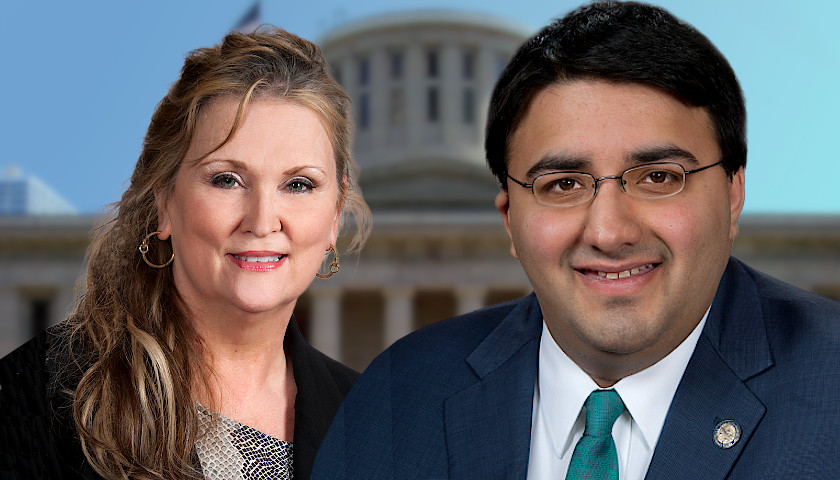Should Dunkleosteus terrelli be Ohio’s official fossil fish? Should the sugar cookie be the official cookie of the state? What about the Monarch Butterfly? Should it become the official butterfly for Ohio? The Ohio Senate believes the answer to the first question is yes. Senate Bill 123 was unanimously passed in the Senate and is now pending in the House. And it’s looking pretty favorable for the sugar cookie and Monarch Butterfly — unless some other cookie or butterfly lovers object. These are just three of the questions facing the Ohio General Assembly this year, in what some consider to be part of the “other” work that representatives and senators do. Amidst the bills on more serious matters, like the state budget and drug sentencing reform, are a host of miscellaneous measures: naming sections of roads, designating special license plates, or declaring a month/week/day in recognition of a person or illness. In fact, such bills are 14 percent of the total in the House and 12 percent of the total in the Senate. Naming a section of a road in Ohio is usually done for person who has died, like a law enforcement officer or member of the military. Sometimes,…
Read the full storyTag: Ohio General Assembly
Heartbeat Bill Set to Become Law in Ohio After Emotional Day at the Statehouse
One of the most divisive and talked-about bills in Ohio’s history is officially on its way to Gov. Mike DeWine’s desk and is expected to be signed into law at any moment. After months of debate and numerous committee hearings, the heartbeat bill passed the Ohio House Wednesday afternoon in a 56-40 vote along party lines. It then went back to the Senate where changes made to the bill in the House were approved in an 18-13 vote. According to Cleveland-based reporter Laura Hancock, four Republicans voted against the bill in the Senate, since it doesn’t include exceptions for rape or incest. Here is the roll call in the #senate Which quickly voted to go with changes made in the Ohio house to #heartbeat #abortion bill. pic.twitter.com/PscVpnLE9P — Laura Hancock (@laurahancock) April 10, 2019 The House Health Committee was still hearing witness testimony on the bill as early as Tuesday, when several pro-choice religious organizations testified against it, as The Ohio Star reported. Protesters and activists from both sides of the debate gathered in the House chambers during Wednesday’s vote. While representatives were casting their votes, pro-abortion activists held a banner over the upper railings of the chambers, which read:…
Read the full storyBuckeye Institute Annual Report Identifies $2.5 Billion in Savings for Ohio Taxpayers
The Buckeye Institute released its annual Piglet Booklet Wednesday, which identifies wasteful government spending across state agencies that could save Ohio taxpayers $2.5 billion. “In this year’s Piglet Booklet, The Buckeye Institute identified at least $2.5 billion that policymakers can save Ohioans. And with the increase in the gas tax, it is critical to cut spending and taxes to relieve the growing burden on Ohio families,” said Greg Lawson, research fellow at The Buckeye Institute and author of the report. “Making these cuts will save Ohio taxpayers money, make government more efficient and effective, and keep the state on solid financial ground to better weather the next economic storm,” Lawson continued. The Piglet Booklet identifies four key areas where government spending and oversight can be reduced, including corporate welfare programs, government philanthropy and advocacy, burdensome occupational licensing regimes, and earmarks in spending bills. “Governments should not engage in crony capitalism by supporting one private company over another—it is ethically inappropriate and economically harmful,” the report says of the corporate welfare category. It identifies eight different “corporate welfare programs that should be eliminated,” such as the $3.1 million that is used to conduct “marketing on behalf of the state’s wine grape…
Read the full storyOhio House Democrats Introduce ‘Equal Pay Act’ to End ‘Pay Discrimination’
Ohio House Democrats unveiled their plans to close the gender wage gap with an “Ohio Equal Pay Act” Tuesday, which marked the annual “Equal Pay Day” in America. Reps. Stephanie Howse (D-Cleveland) and Randi Clites (D-Ravenna) discussed their bill at a press conference alongside several of their Democratic colleagues. “Ohio’s gender wage gap continues to hold back women, families, and our economy. We can’t get ahead as a state if half of our workforce is undervalued and underpaid,” Howse said. “We need real, commonsense reforms to restore our promise as an opportunity state where everyone who works hard, regardless of gender, has a shot at the American dream.” The bill, which has yet to receive an official number, would require companies who contract with the state government to obtain an “Equal Pay Certificate,” which would certify that female employees have the same opportunities for career advancement. It would also require government agencies to conduct evaluations of their employees’ pay scales to “ensure compensation is based on responsibilities and working conditions across job categories,” a press release from the House Democrats explains. “It’s long past time to empower women in the workplace to be what they are—equal,” Clites said during Tuesday’s…
Read the full storyOhio Republicans Look to Crack Down on Sanctuary Ordinances After Dayton Public Schools Declares Itself a ‘Sanctuary District’
Two Republican state representatives in Ohio introduced a bill Tuesday to ban sanctuary ordinances after the Dayton Public Schools Board of Education voted to become a “sanctuary school district” last week. House Bill 169 was introduced by Reps. Niraj Antani (R-Miamisburg) and Candice Keller (R-Middletown), who said in a joint press release that the school district’s “new policy requires the school district to not cooperate with federal immigration officials, not allow federal immigration officials inside school buildings, and bans the collection of the immigration statuses.” The Dayton Daily News reports that the school board’s resolution was titled a “Safe and Welcoming School District,” and affirmed that the district “shall do everything in its lawful power to ensure that our students’ learning environments are not disrupted by immigration enforcement actions.” Under House Bill 169, “state or local government” agencies or a “political subdivision” would be prohibited from adopting “an ordinance, policy, directive, rule, or resolution that prohibits or otherwise restricts a public official or employee” from cooperating with federal immigration enforcement. Additionally, the bill would prevent sanctuary cities, counties, townships, or municipal corporations from receiving “homeland security funding and any local government fund distributions from the state.” “In the past few…
Read the full storyOhio Legislators Applauded for Addressing ‘Seriously Flawed’ School Funding Formula, But Questions Still Remain
After 15 months, a bipartisan workgroup unveiled its Fair School Funding Plan to overhaul Ohio’s school-funding formula, but some still had questions about how it will accomplish what Ohioans need. Reps. Bob Cupp (R-Lima) and John Patterson (D-Jefferson) spearheaded the workgroup along with superintendents and educators from across the state, and announced their findings during a Monday press conference. “We are excited because we’re here to announce the release of the School Funding Workgroup’s recommendations for comprehensive redesign of Ohio’s primary and secondary school funding framework,” Cupp said, calling the new funding plan “fair, more predictable, and more workable.” “It’s widely recognized that our current funding formula, forged in the last recession, is seriously flawed. Experience has shown that it’s not any longer even functioning as a formula,” he continued, saying the current funding formula is “more a patch than a formula.” At the start of the 15-month process, the School Funding Workgroup was charged with considering “what our students truly need to succeed in this rapidly changing world, and to develop recommendations to meet those needs that are fair to Ohio’s kids, school districts, and taxpayers.” “Over four-fifths of districts are either on a cap, which limits the funding…
Read the full storyOhio House Democrats Question ‘Fiscal Stability’ of Republican Governor’s $69 Billion Budget Proposal
Ohio House Democrats are raising concerns over the “fiscal stability” of Republican Gov. Mike DeWine’s $69 billion budget proposal released Friday. House Minority Leader Emilia Strong Sykes (D-Akron) said that while her caucus was “encouraged by the governor’s commitment to supporting Democratic policies of investing in families, maintaining access to quality, affordable health care, and cleaning up Lake Erie,” she had concerns about the proposal’s “fiscal stability.” “We have serious concerns regarding the fiscal stability of the current proposal. We can’t build a budget on broken economic assumptions or wishful thinking. We need to be honest and realistic about where new spending comes from,” she continued. Rep. Jack Cera (D-Bellaire), the House Democratic budget panel leader, said he was “heartened that the governor is stepping up on a number of issues Democrats have been pushing,” but had similar concerns about its “fiscal assumptions.” “That promise is sacred, and it can’t be built on shaky economic ground or faulty fiscal assumptions. The governor is proposing investments, but it’s unclear where the additional spending will come from,” he said. Cera went on to claim that “investing in education and children is important,” but the state needs “to be realistic about [its] fiscal…
Read the full storyBipartisan Bill Would End Ohio’s ‘Disastrous’ Academic Distress Commissions
A bipartisan bill that would overturn state takeovers of low performing local schools is set to be introduced in the Ohio General Assembly next week. Under House Bill (HB) 70, a 2015 legislation, the state superintendent of public schools is required to intervene via “Academic Distress Commissions” for “each school district that has been declared to be in academic emergency.” That bill was authorized two years after the 2013 establishment of the Lorain Academic Distress Commission for the Lorain City School District. The “ultimate goal” of the commission was to “improve academic achievement of the [Lorain City School District] to such an extent that all graduates successfully enter a career or college pathway.” The commission, as it stands, would cease to exist after Lorain City School District receives a “C” grade or better on the Ohio Department of Education’s performance index score and the value-added progress dimension for two of three school years, which it has evidently thus far failed to do. As a result, Rep. Joe Miller (D-Miller) and Rep. Don Jones (R-Freeport) are planning to introduce a bill that would overturn HB 70. “Placing these districts under state control has been a disaster. In each case, the Academic Distress…
Read the full storyGun Rights Bill Kasich Vetoed is Law in Every Other State
Gov. John Kasich (R-OH) vetoed the Ohio General Assembly’s gun-rights legislation Wednesday, even though the bill was removed of most of its substantial provisions before passage. As The Ohio Star reported last week, House Bill 228 was stripped of its “stand your ground” measure, which would free gun owners from abiding by a “duty to retreat” law that requires them to stand down in life threatening situations. After it was removed, the Ohio Gun Owners organization said it was “looking at this thing as a big ‘nothing burger’ now.” The bill did, however, still include a provision that would shift the burden of proof from defendants to the prosecution in self-defense cases—the current law in all 49 other states. But Kasich was upset that the bill didn’t include a “red flag” law, which allows the government to seize guns from people who are mentally ill or are considered a danger to others. “We can’t get it done over there. This really infuriates me,” he said this week, according to The Columbus Dispatch. “Why would I sign a bill that gives more power to gun advocates?” “For the first time in my lifetime, the possibility of somebody coming through that door…
Read the full story







